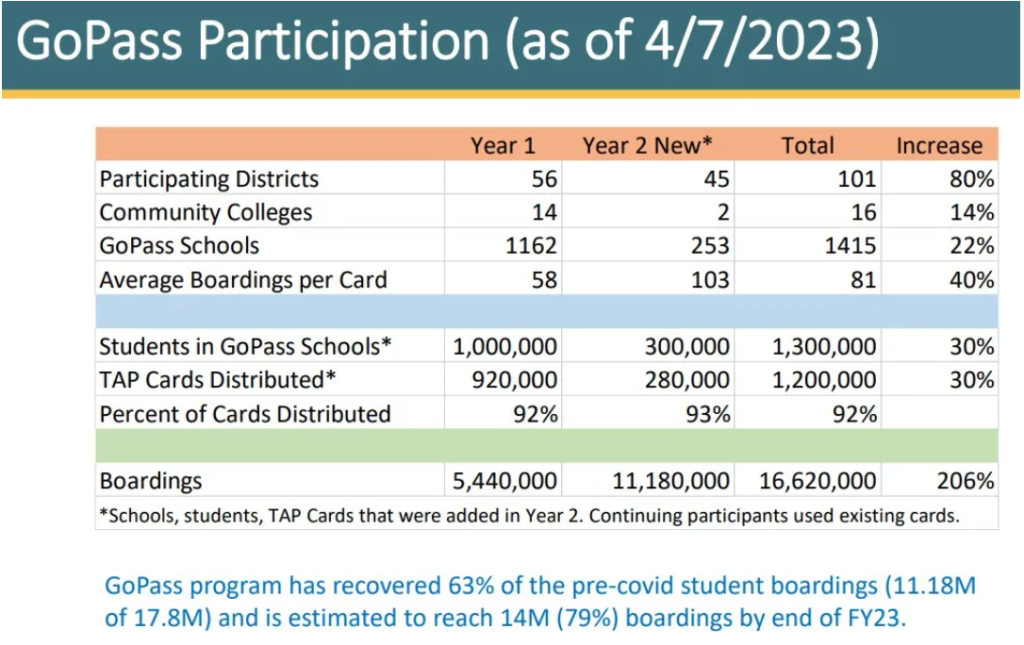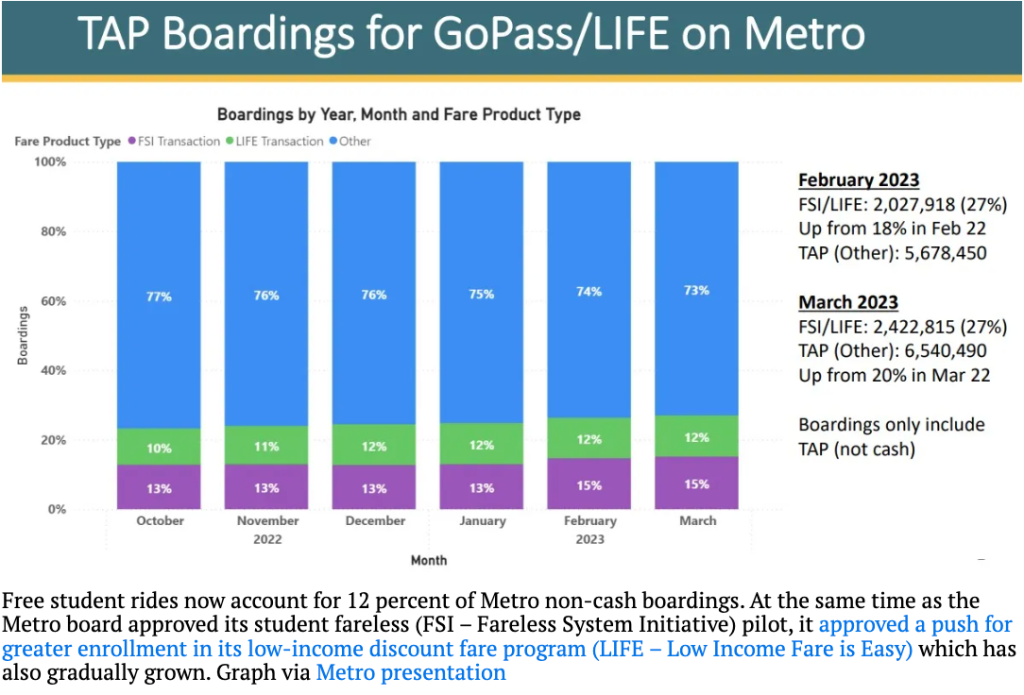The first article appeared in Streetsblog Los Angeles.
hen the Metro board met last week, they approved extending the agency’s free student pass program for an additional year. The GoPass program was already approved through this June, and will now extend through the end of June 2024.
Metro, in a press statement, noted that the GoPass pilot program improves equity, increases transit ridership, positively impacts public health, and benefits the environment with reduced greenhouse gas emissions and improved air quality.
Metro approved its current free student ride pilot program in September 2021, when the agency’s board trimmed back the prior CEO’s pledge to pilot universal transit, to “eliminate fares for all riders.” Metro’s free pass program is branded as its “Fareless Services Initiative” (FSI). It serves participating school districts and Community Colleges.
Metro soft launched the student passes with a handful of districts late summer 2021. The program officially launched for the county’s largest-by-far district (LAUSD) in October 2021, though many LAUSD students were unable to ride free until they obtained new GoPass TAP cards, which trickled out through late 2021 and early 2022. (Due to the pandemic, Metro had been charging fares only on rail in late 2021; the agency resumed collecting bus fare on January 10, 2022.)
Last week, Metro staff presented some recent statistics on the student pass program. Per Metro, 237,067 students (190,069 K-12 students and 46,998 Community College students) have registered as GoPass participants; that total represents nearly 20 percent of the more than two million students in L.A. County. Metro notes that 86 percent of students registered (203,878) are active riders; those active participants have averaged 81.5 boardings each.

Metro student GoPass statistics spreadsheet – via Metro presentation
As of early May (nearly two years into the program), overall student free transit boardings have totaled 16.6 million.

Free student rides now account for 12 percent of Metro non-cash boardings. At the same time as the Metro board approved its student fareless (FSI – Fareless System Initiative) pilot, it approved a push for greater enrollment in its low-income discount fare program (LIFE – Low Income Fare is Easy) which has also gradually grown. Graph via Metro presentation
Student GoPass boardings currently comprise 12 percent of Metro non-cash boardings. (According to another presentation last week, about 43 percent of Metro boardings are cash.)
Metro estimates that families of K-12 students who participate in the GoPass Program typically see an annual savings of $288 per student compared to the previous Metro reduced student fare program.
For the initial two-year program, Metro made up lost fare revenue using federal American Rescue Plan Act (ARPA) funding alongside some cost-sharing from participating schools and school districts. For the one-year program extension, Metro anticipates lost fare revenue would have totaled $20 million, which will be covered as part of Metro’s operating budget. Metro also continues to pursue other outside funding to continue and possibly expand FSI.
Transit advocates, including the Alliance for Community Transit, Strategic Actions for a Just Economy, and others continue to urge Metro to provide universal fareless transit, noting that Metro spends a great deal of fare revenue to collect, process, and enforce fares. Advocates assert, including during public comment on last week’s FSI approval, that instead of making riders go through enrollment processes for GoPass, or Metro’s senior and low-income (LIFE – Low Income Fare is Easy) discount fare programs, Metro could advance equity and improve ridership by making buses and trains free to ride.
L.A. County students/families interested in participating in the GoPass program can find more information at Metro’s program webpage. The student GoPass is currently accepted on Metro, City of Commerce Transit, Culver CityBus, Foothill Transit, Glendale Beeline, GTrans [Gardena], LADOT Dash, L.A. County Shuttles, Long Beach Transit, Montebello Bus, Norwalk Transit, Pasadena Transit, Santa Monica Big Blue Bus and Torrance Transit.
